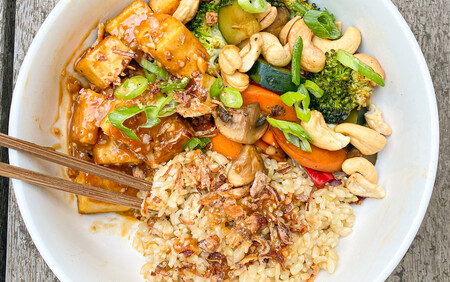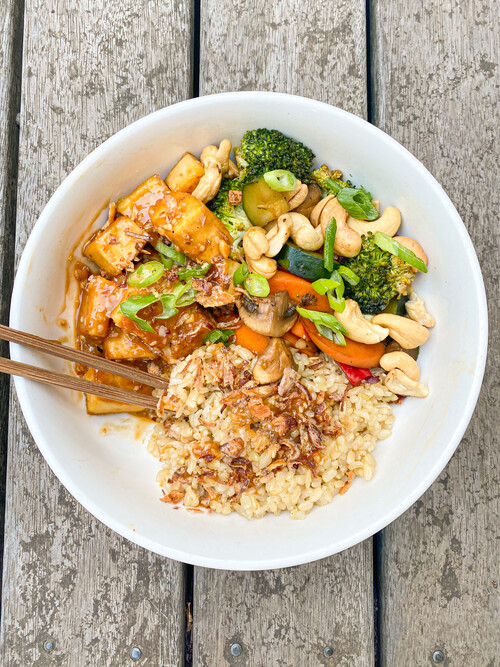
Vegetarian diets while trying to conceive – friend or foe?
Dietician Wendy Fedele shares her insights into the benefits of plant-based diets, as well as some considerations to plan for.
Vegetarian diets are becoming increasingly common, as people become more conscious of the impact of diet on their health – and the environment. But the question is, “How do they stack up when it comes to your fertility?
At first glance, plant-based diets tick some big fertility nutrition boxes – if based mostly on whole foods like vegetables, fruits, grains, beans and legumes, nuts and seeds, these diets tend to be high in fibre and an excellent source of antioxidants and polyphenols to help protect our reproductive cells from oxidative stress and inflammation.
They’ll also naturally be low in (or lacking) animal proteins – namely meat. While we don’t need to avoid red meat when trying to conceive, research does support a lower intake (especially of processed meats), and this is a key feature of the Mediterranean diet and the Profertility diet – Two eating styles that research has shown to be beneficial for fertility generally and in the IVF context.
A very large and well-known study, called the Nurses’ health Study II, also showed that replacing just 5% of animal protein with plant-based protein was associated with a more than 50% lower risk of ovulatory infertility.
So are there any risks to a Vegetarian diet while you’re trying for a baby? Well after reviewing the evidence, The American Academy of Paediatrics concluded that well-planned vegetarian and vegan diets are suitable at all life-stages, including pregnancy and breastfeeding.
The “Well planned” part is the key here though, as research shows that women following plant-based diets, particularly Vegan diets, are at risk of not meeting the recommended intakes for several nutrients that are critical for fertility and during pregnancy, such as iron, zinc, iodine, calcium, Vitamin D, Vitamin B12, and Omega 3 fatty acids.
While it’s a great idea to check in with your friendly dietitian for a nutrition review to ensure you’re meeting nutrient needs, some things to be mindful of if you are following a plant-based diet while trying to conceive are:
Ensuring you include a variety of protein sources, such as beans and legumes, soy-based food, nuts and seeds, and if you include some animal foods eggs and dairy. This will provide essential amino acids needed for all stages of reproduction, and these foods are also great sources of important fertility nutrients that can be harder to obtain on plant-centric diets, such as iron, zinc,
If you don’t include any animal derived foods like eggs and dairy on a regular basis, chat to your dietitian about B12 supplementation, as this is only found naturally in animal foods
Unless you’re pescatarian, consider adding an Omega 3 fatty acid supplement to meet your EPA/ DHA fatty acid needs to support fertility and pregnancy needs, as we get these from oily fish like salmon, sardines, mackerel, herring and trout.
Plant-based diets are more likely to be low in iodine, which is a critical for thyroid function to support fertility and maintain a pregnancy, and inadequate amounts can also impact the cognitive health of your baby in pregnancy. It’s therefore really important you’re taking the recommended 150mcg of iodine, usually as part of your prenatal multivitamin, when trying to conceive (unless contraindicated – e.g with certain thyroid conditions), and consider using iodised salt. Bread, dairy, eggs, seaweed are other vegetarian foods that provide iodine.
Aim for 2-3 serves of dairy daily to help meet your preconception calcium needs. If avoiding dairy, use calcium fortified plant-based alternatives like calcium fortified soy milk and include other plant-based calcium foods like tofu, beans and legumes, tahini, chia seeds, kale, broccoli, almonds, bok choy, dried figs and oranges.
Include plant-based iron rich foods in most meals (such as beans and legumes, tofu and tempeh, nuts and seeds, wholegrains, dark leafy greens – and pair with Vitamin C rich foods to help increase the absorption as we don’t absorb plant-iron as well as animal derived.
This plant-powered tofu and cashew nut stir fry is a great addition to your plant-based fertility diet – Not only is it quick and delicious, it’s also packed with good quality plant protein and iron as well as so many other fertility supporting nutrients.
Some things to be mindful of if you're following a plant-based diet
Variety of protein sources
Ensuring you include a variety of protein sources, such as beans and legumes, soy-based food, nuts and seeds, and if you include some animal foods eggs and dairy. This will provide essential amino acids needed for all stages of reproduction, and these foods are also great sources of important fertility nutrients that can be harder to obtain on plant-centric diets, such as iron or zinc.
B12
If you don’t include any animal derived foods like eggs and dairy on a regular basis, chat to your dietitian about B12 supplementation, as this is only found naturally in animal foods
Omega 3
Unless you’re pescatarian, consider adding an Omega 3 fatty acid supplement to meet your EPA/ DHA fatty acid needs to support fertility and pregnancy needs,as we get these from oily fish like salmon, sardines, mackerel, herring and trout.
Iodine
Plant-based diets are more likely to be low in iodine, which is a critical for thyroid function to support fertility and maintain a pregnancy, and inadequate amounts can also impact the cognitive health of your baby in pregnancy. It’s therefore really important you’re taking the recommended 150mcg of iodine, usually as part of your prenatal multivitamin, when trying to conceive (unless contraindicated – e.g with certain thyroid conditions), and consider using iodised salt. Bread, dairy, eggs, seaweed are other vegetarian foods that provide iodine.
Dairy
Aim for 2-3 serves of dairy daily to help meet your preconception calcium needs. If avoiding dairy, use calcium fortified plant-based alternatives like calcium fortified soy milk and include other plant-based calcium foods like tofu, beans and legumes, tahini , chia seeds, kale, broccoli, almonds, bok choy, dried figs and oranges
Iron
Include plant-based iron rich foods in most meals (such as beans and legumes, tofu and tempeh, nuts and seeds, wholegrains, dark leafy greens – and pair with Vitamin C rich foods to help increase the absorption as we don’t absorb plant-iron as well as animal derived.
Plant-powered tofu and cashew stir fry
Ingredients
Stir fry:
1 (14 ounce) package extra firm tofu
1 tbsp cornflour
½ tsp salt
3 tbsp olive oil (split in two)
2 garlic cloves, finely chopped or minced
½ onion, peeled and sliced
1 large carrot – cut into ½ moons
1 cup mushrooms, sliced
1 capsicum sliced
1 head of broccoli, chopped into small florets (you can also use the stem, slice thinly)
1 tbsp ginger, finely chopped or minced
Stirfry Sauce:
1 tbsp cornflour
1.5 tbsp soy sauce
2 tsp Oyster sauce
1 tbsp Mirin
0.5 tsp sesame oil
Pinch of pepper
¾ cup water
To serve:
Small bunch of spring onions – sliced
40g cashews
Cooked brown basmati rice ( ~1/3-1/2 cup cooked rice per person)
Directions
- Start with your tofu: Drain tofu from the packaging, removing all liquid. Place some paper towel or a tea towel over a plate, place your tofu on top, top with more paper towel or another tea towel, and then top with another plate or a heavy pan (or I often put some heavy books on top of the pan – you want to weigh it down to draw out as much moisture as possible. Let the tofu fry for at least 15 minutes.
- While the tofu is drying, put together your stir fry sauce: Place 1 tbsp cornflour and ¾ cup of water into a bowl and mix until your cornflour is dissolved. Add the remainder of your sauce ingredients and mix well.
- Once your tofu is dried cut it into small cubes and toss them in 1 tablespoon of cornstarch and ½ teaspoon of salt (I find it easiest to put it all in a zip-lock bag and shake it all together until the tofu is coated.
- Add ½ your olive oil to a wok or large pan over a medium-high heat, add your tofu and let fry for 3-7 minutes, Flip tofu until browned on all sides, remove to a plate an set aside.
- Add the remaining oil to your pan/ wok, increasing the heat to high. Add your garlic and ginger and stir for ~ 10 seconds, then add your onion and stir for another 30 seconds.
- Add the rest of your vegetables except for the mushrooms, stir for around 1 minute.
- Add your mushrooms and stir for another 2-3 minutes, until all veggies are almost cooked (you want them to still be a bit firm, not mushy!).
- Stir in your prepared sauce and toss for about a minute - the sauce should thicken and become “glossy”.
- Add your tofu to the pan and stir through so it’s coated with the sauce.
- Serve with cooked Basmati rice and top with spring onions and cashew.
YUM - Share a photo of your cook-up with #BeforeBaby2023!
